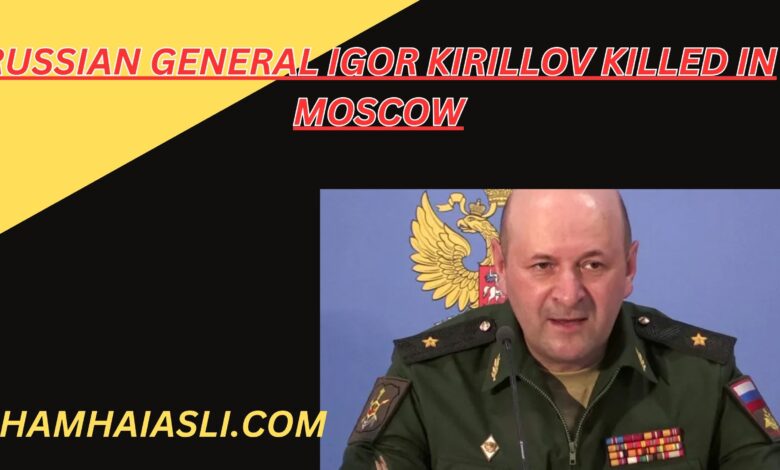
Who Was General Igor Kirillov, the Russian General Assassinated in Moscow?
On December 17, 2024, the news of the assassination of Lieutenant General Igor Kirillov shocked the world. As the head of Russia’s Nuclear, Biological, and Chemical Defense Forces, Kirillov held a crucial role in overseeing Russia’s weapons of mass destruction strategy. His death, allegedly orchestrated by Ukrainian intelligence agents, marks a significant escalation in the ongoing Russia-Ukraine conflict, highlighting the evolving nature of modern warfare.
Who Was General Igor Kirillov?
General Igor Kirillov was a 54-year-old senior officer in the Russian military. He was primarily responsible for managing Russia’s nuclear, biological, and chemical defense programs. In this high-level position, Kirillov played a key role in ensuring that Russia’s defense systems in these critical areas remained strong, especially as the war in Ukraine intensified. His department was particularly known for overseeing Russia’s chemical weapons stockpiles, which made him a controversial figure both within and outside the country.
The Assassination in Moscow
The assassination of General Kirillov occurred in Moscow on December 17, 2024, when an explosive device was planted in an electric scooter near his residence. Ukrainian intelligence agencies are believed to have orchestrated the attack, which killed both Kirillov and his assistant, Ilya Polikarpov. The bomb detonated as Kirillov approached the scooter, causing instant fatalities. This act of targeted violence has brought international attention to the Russia-Ukraine conflict and raised questions about the increasing use of intelligence operations in modern warfare.
Why Was General Kirillov Targeted?
Ukraine had long accused General Kirillov of being involved in chemical attacks on Ukrainian soldiers. Allegedly, Kirillov authorized the use of chemical weapons, including toxic irritant grenades, against Ukrainian forces. These actions led Ukraine’s Security Service (SBU) to label him a “war criminal” and to justify his assassination as a legitimate military action. The attack highlights the use of targeted strikes as part of Ukraine’s strategy to hold Russian officials accountable for alleged war crimes.
Impact on the Russia-Ukraine Conflict
The death of General Kirillov marks a significant moment in the ongoing Russia-Ukraine war. It signals an intensification of the conflict, with both nations now engaging in covert intelligence operations and targeted assassinations. This approach, which relies on precision strikes against key military figures, shows how modern warfare is becoming more complex and reliant on intelligence, cyber operations, and specialized tactics rather than traditional battlefield confrontations.
The assassination is also a demonstration of the lengths to which both sides will go in their struggle for military superiority. While such operations may offer temporary tactical gains, they also risk deepening the conflict, leading to further retaliatory actions and prolonging the cycle of violence.
Global Reactions and Consequences
Internationally, the assassination of such a high-ranking Russian official has significant implications. As the head of Russia’s defense against nuclear, biological, and chemical threats, Kirillov’s death has shaken the Russian military and government. The Kremlin has vowed to avenge the killing, which may lead to even more intense confrontations.
The incident also complicates efforts for global peace and stability, as the conflict between Russia and Ukraine continues to draw in the attention of international leaders. Countries around the world are closely monitoring the situation, with many calling for de-escalation and diplomatic solutions.
Conclusion
The assassination of General Igor Kirillov is a stark reminder of the complexities of modern warfare. It reflects how intelligence operations and covert strikes are reshaping the way conflicts are fought. As the Russia-Ukraine war enters a new phase, the world will be watching to see how this targeted killing influences the dynamics of the conflict. This tragic event underscores the high-stakes nature of global security, where military leaders and government officials are increasingly vulnerable to attacks, and where the consequences of such actions can ripple far beyond the battlefield.

